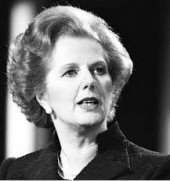 The death of Margaret Thatcher has generated a good deal of reflection, at various levels of sobriety and cogency.
The death of Margaret Thatcher has generated a good deal of reflection, at various levels of sobriety and cogency.
At AllAboutAlpha we say our goodbyes to this world-historic figure by remembering two points in particular: London’s transformation in the “Big Bang” of the mid-1980s; and Thatcher’s long-term Euro-skepticism, skepticism sharply voiced as Thatcher left office in 1990, and surely vindicated by quite recent events.
In October 1986, due to a range of initiatives supported by the Thatcher government: electronic trading arrived in The City in a big way (SEAQ); the old broker/jobber distinction disappeared; as did fixed commissions; and foreign ownership of U.K. brokers became possible.
One anecdote makes an important point: not long before this Big Bang a consultant had been surprised to learn that a certain senior partner at a very successful London jobber, Wedd Durlacher Mordaunt, couldn’t travel to the U.S. to meet counterparts in New York. Why not? Because he didn’t have a passport. It seems unimaginable today that someone in such a position would be so homebound, but this gentleman had never left Britain and had never seen a reason to.
The Success of a Big Bang
The great success of the Big Bang was that it shocked the Square Mile out of such insularity. Despite the great prestige and centuries-old history of London as a – for long stretches the – global financial center, its importance was in relative decline. As The Independent put it in a story on the 20th anniversary of the Bang, a shake-up was imperative to blast the old boys into retirement, and their heirs into the postmodern age.
As a consequence of these changes, dealing costs for large trades tumbled an average of 30% over the year following the Bang. London recaptured its centrality. The turnover and value of London-based equity transactions increased from roughly £500 million in 1986 to more than £2 billion nine years later.
There have been some expressions of nostalgia since for the more genteel capitalism of an earlier time, and the Thatcherite reforms can be painted (as can any of several other events one might name) as the expulsion from a Garden. Still, such effusions seem more a genre of poetry than a contribution to understanding.
Thatcher the Euroskeptic
Thatcher was a euroskeptic back before euroskepticism was the order of the day. In a 2002 book, Statecraft, she wrote, “The European single currency is bound to fail economically, politically, and indeed socially, though the timing, occasion and full consequences are still unclear.”
That conclusion, one which sounds prescient today, did not arise from any knee-jerk isolationism. Quite the contrary. When Thatcher led the opposition, and James Callaghan was the prime minister, Thatcher used to wear a sweater (the EUObserver has called it a “garish sweater”) picturing the flags of the eleven (other) member states of the EC. She did this not to make a fashion statement but to make a political statement: at that time it was Labour that was the more tempted of the great parties to take a go-it-alone stance, and Callaghan refused to sign on to the European Rate Mechanism.
A Runaway Train
Yet during her years on Downing Street she came to see European integration as something of a runaway train. In September 1988, speaking at the College of Europe in Bruges, she cautioned that “to try to suppress nationhood and concentrate power at the centre of a European conglomerate would be highly damaging and would jeopardize the objectives we seek to achieve.”
Despite her growing reservations, the UK did join the ERM on Thatcher’s watch. It was indeed one of the last major decisions of her tenure. It came about in October 1990 and the party coup by which she was ousted took place the following month.
In her last speech in the House of Commons she warned about the overly ambitious ECB, “The point of that kind of European Central Bank is no democracy, taking powers away from every single Parliament.”
Britain didn’t stay in the ERM long enough to see that mechanism transform into a single currency, so it wasn’t part of the Eurozone when the ECB became as powerful as it has now become. That is not Thatcher’s legacy; it is a legacy of George Soros’ successful bet against the pound two years later. Still, she was its prophet.
She warned about a runaway train and Soros pushed Britain off the train in time.



